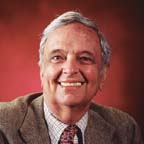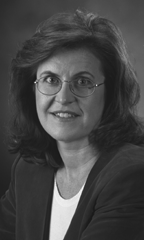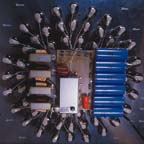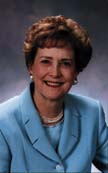
Fishwick honored for internationalizing popular culture
Physicists may find particle smaller than quark
Tech engineers to analyze Titanic stresses for Discovery
Groundbreaking drama delivered online
Tech in top 9 with Title IX
Ann Spencer named Distinguished Alumnus in Pamplin College of Business
Tech researchers issued 25 patents
Prim Jones honored by College of Engineering
More than 4,000 degrees conferred May 10
Tech professors enjoy on-camera stints
DISTINCTIONS

Virginia Tech and Hyderabad, India, have something in common -- the energy of Virginia Tech popular-culture professor Marshall Fishwick.
Fishwick has been instrumental in establishing in Hyderabad the American Studies Research Center, which now houses the largest collection of American books in Asia.
The American studies and popular-culture professor was honored in February by the American Culture Association and the Popular Culture Association with the Ray and Pat Browne Award for lifetime achievement.
Fishwick went to India in July, where he l led four regional conferences scheduled by the U.S. Information Agency. An experienced traveler, he has received Fulbright grants to Denmark, Germany, Russia, Italy, Korea, and India. His new journal, International Popular Culture, is based on the work of colleagues in these countries.
Fishwick's latest textbook, An American Mosaic: Rethinking American Culture History, employs technology that allows for constant revision and updating. His other publications include: The Hero, American Style; Great Awakenings: Religious Awakenings in America; Clara Barton; Go and Catch a Falling Star, and others.
Analysis of data taken at an electron-proton collider in Germany from 1994 to 1996 has revealed five "events" that may change the standard model of matter, according to Tech physics professor Luke Mo, who is a member of the executive group for the ZEUS experiment.
Scientists are working in miles-long underground facilities to force the collision of submicroscopic particles in an effort to discover the smallest building block of all matter, the particle that cannot be further split into parts.
Until a few decades ago, the electron, proton, and neutron, which make up the atom, were considered the basic building blocks of all matter. Now scientists know there are subparticles, such as quarks.
But the data collected during the 1994-96 experiments suggests that quarks are not the smallest particles. "We're not sure what it's about," Mo says, "It could mean the quark is not the smallest particle or it could be merely a statistical fluctuation."
The researchers, excited by the new finding, began new experiments in March to see if the data backs up the discovery. If it confirms the findings, the researchers will need more energy than they have now to probe further and further into the subparticles (the smaller the distance, the greater the energy needed). Such energy requires a large hadron collider, which smashes proton against proton. Two such experiments have been approved, the ATLAS and the CMS at CERN, Geneva, Switzerland. Researchers at Virginia Tech are members of the latter.
Three Virginia Tech engineering alumni and a current student have helped television's Discovery Channel address some intriguing questions about the RMS Titanic's tragic sinking on April 15, 1912.
Discovery aired "Titanic, Anatomy of a Disaster" on April 13 to commemorate the 85th anniversary of the catastrophe.
More than 1,500 lives were lost when the "unsinkable" ship went down after colliding with an iceberg in the North Atlantic during its maiden voyage. The wreckage was found in 1985, about 12,000 feet below the surface.
The April documentary included an engineering study of how and why the ship sank and broke apart. Using information from the expedition, three engineers at Gibbs and Cox -- all Virginia Tech alumni -- conducted a stress analysis of the Titanic's hull for the documentary.
Engineer James Belshan (aerospace and ocean engineering '95) worked with Christopher Geiman, a Tech cooperative education student for Gibbs and Cox in 1996, to construct a computer model of the ship. The model was designed to analyze stresses acting within the ship's hull, both before and after the collision with the iceberg.
Belshan and Linda Constantine (aerospace and ocean engineering '93, M.S. '95), another Gibbs and Cox junior engineer, modified the computer model to provide input from the documentary's producer, Gregory Andorfer. David Wood (aerospace and ocean engineering '85), manager of the Gibbs and Cox structures department, oversaw the modeling and stress analysis.
The stress analysis, Constantine says, helps explain why the Titanic broke up into three pieces -- how, for example, significant flooding in the forward part of the ship led to catastrophic failure of the hull.
It was a performance at Virginia Tech, but part of the audience was in cyberspace. A planetarium in Colorado took part, as did a woman in Austria and the theater department at the University of Hawaii.
An online project by MFA student Matthew Saunders, the performance of the play MobiusTrip took place in a physical space -- the Performing Arts Building at Virginia Tech -- in April with a real audience. However, through a bi-directional link, people in the theater saw an audience watching from cyberspace and vice versa.
The performance was broadcast over the Internet and those watching online could interact afterwards in a real-time talk-back session.
This was the third part of Saunders' final master's project. Through video, live performance, stills, and text, the audience joined Mobius in a voyage through his memories of the beauty and pain of childhood.
The first part of the project was Renaissance Man, an online play featuring a virtual actress in a remote location. Part II was called "The On-Line Front Porch" and featured a traditional Southern Appalachian old-time band and cyberspace audience interaction.
Virginia Tech is one of nine educational institutions in the nation to meet federal standards for providing athletic opportunities to both men and women proportional to their enrollments.
Tech is also one of three universities to come within a percentage point of difference between female enrollment and athletic participation, according to a survey by USA Today. Forty-one percent of Tech's undergraduates and 40 percent of its athletes are women. The 25-year-old Title IX law requires colleges to have female athletic participation within 5 percentage points of their female enrollment.
The survey looked at almost 350 Division I schools, which are defined by the number of full athletic scholarships they offer.
Tech has made an efort to its women's sports program since 1994. Before 1993, women made up about 20 percent of Tech's athletes and about 40 percent of its undergraduates.

Ann Spencer (accounting '76, MBA '84), former associate vice president for personnel and administrative services at Virginia Tech was the eighth recipient and the first woman to receive the Distinguished Alumnus Award from the Pamplin College of Business at graduation ceremonies.
The award reflects the college's appreciation for her many contributions to the college and the university, says Richard Sorenson, dean of the Pamplin College of Business.
During her years at Tech, Spencer reorganized personnel services around customer-service modules, brought an employee wellness program to the university, and was responsible for the installation of the first comprehensive human-resource system. Spencer retired in April for health reasons.
Spencer has participated in regional and national professional associations and in community affairs in addition to her job at Tech. She has served on the board of directors and on numerous committees for the national and Eastern associations of university business officers. She also has served on the boards of several community organizations, including Columbia Montgomery Regional Hospital.

Virginia Tech researchers earned 25 patents during 1996. Areas related to electronics and materials received the most patents, with faculty members and students in the Virginia Power Electronics Center (VPEC) and the Center for Advanced Ceramic Materials receiving three each.
Patents ranged from a zero-current transition switching technique to a high-temperature curing agent for adhesive materials and two patents for methods of diagnosing and treating the risk of hypertension during pregnancy. These patents are being marketed by Virginia's Center for Innovative Technology.

One of the first alumnae to graduate with honors in engineering returned May 10 to accept the Distinguished Alumnus Award from her college.
Mary Virginia "Prim" Jones (engineering '62) was honored for her willingness to serve as a role model for women in the engineering profession, said F. William Stephenson, dean of the College of Engineering.
"She is truly one of the pioneers of women in this highly competitive, highly technical arena. Her life is full of 'firsts,'" he said.
Among her many firsts, Jones was the first woman registered as a professional engineer in Virginia, the first woman appointed by the governor to serve on the Virginia Tech Board of Visitors, and the first to receive her alma mater's University Distinguished Achievement Award. She currently works as the technical director for all new business initiatives at the Solid Propulsion Division at Atlantic Research Corp. (ARC) in Gainsville, Va. Jones remains the only woman at ARC to have held two of the four director of engineering positions.
More than 4,000 students received degrees from Virginia Tech at commencement May 10. The university conferred 2,760 bachelors degrees, 878 master's, 210 Ph.D.s, 79 DVMs, 36 associate degrees, 19 certificates of advanced graduate study, and 29 Ed.D.s.
By college, degrees were awarded as follows: Agriculture, 283; Architecture, 218; Arts and Sciences, 1,179; Business, 507; Engineering, 945; Forestry and Wildlife, 128; Human Resources and Education, 668; and the Virginia-Maryland College of Veterinary Medicine, 83.
The spring graduation brings the total number of degrees Virginia Tech conferred over the 1996-97 academic year to almost 6,200.
Raymond Lane, president and CEO of the Oracle Corp., spoke at the undergraduate ceremonies on the challenge of solving world social and health problems. Lane's daughter, Karin, is a sophomore liberal arts major at Virginia Tech.
The joke at history professor Glenn Bugh's house is that he'll end up on the cutting-room floor and all that will be left of him in the television documentary "Caligula" for A and E's Biography will be "Glenn Bugh, Consultant" in the credits.
Bugh is one of a growing number of Virginia Tech professors who have been recruited by film-production companies making documentaries for the Discovery Channel, the Arts and Entertainment (AandE) network, and other film projects. Psychologist Sigrid Gustafson, for example, recently was flown out to San Francisco to tape a program for Discovery on "Wild Rides II" about people who ride roller coasters and other risky vehicles. The crew liked her expertise about risk takers so much they interviewed her for a second program, "Extreme Rides."
Bugh and Gustafson join other Virginia Tech professors whose expertise has been in demand by television. These include James Robertson, history professor who has made several appearances on programs about the Civil War shown on AandE, public television, and other networks; Clifton Bryant, who was interviewed extensively for AandE channel's "Ancient Mysteries" series episode on ancient burial rites; and Doris Zallen, associate professor in the Center for Interdisciplinary Studies, who served as an off-camera consultant for a segment of the television drama series "Chicago Hope" devoted to gene therapy.
The 1996-97 edition of The Philosophical Gourmet Report ranks Virginia Tech's M.A. program in philosophy in a tie for second out of 76 master's programs nationwide.
The Virginia Tech Block and Bridle Club was recently named the best in the nation among 84 chapters for its activities. The club's activities range from hosting an annual Meat-In Day to sponsoring a university livestock show and running a barbecue booth at the state fair.
Virginia Tech's graduate education programs were ranked among the country's top graduate schools in the U.S. News and World Reports' 1997 edition of America's best graduate schools. Tech's vocational technical education program was ranked fourth in the nation for 1997 and the whole graduate education program placed 50th in the nation.
Back to Contents
Back to News Page
Home | News | Features | Research | Philanthropy | President's Message | Athletics | Alumni | Classnotes | Editor's Page